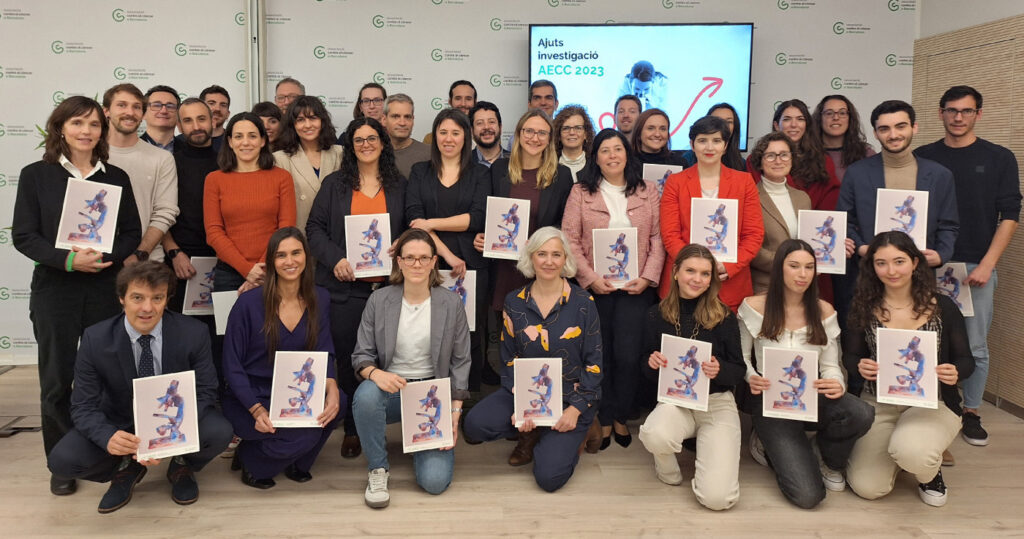The aim of this innovation project is the preclinical development of a drug to overcome the persistence or recurrence of cancer.
The Association Against Cancer in Barcelona has presented the Research Grants 2023, with 29.4 M€ awarded in 233 grants throughout Spain, 44 of which will be developed in Barcelona, with the aim of increasing the average survival of people with cancer to 70% in 2030 and bringing the results of research to the patient. This year’s grants include support for four projects led by Vall d’Hebron.
In the category Clinical Studies AECC 2023, with 999,644 €, a grant has been awarded to a phase III clinical trial led by Dr. Irene Braña, researcher of the Head and Neck Cancer group at Vall d’Hebron Institute of Oncology (VHIO), on immunotherapy and radiotherapy in oligometastatic head and neck squamous cell carcinoma. This study will be the first international effort to investigate the potential benefits of such a combined approach in head and neck cancers.
Head and neck cancers are tumors that in most cases curative treatments (surgery or radiotherapy) are not feasible. Although immunotherapy has revolutionized cancer therapy, in many cases this treatment is not active enough to control the cancer for a long time and patients end up dying within the first year and a half after diagnosis with tumor recurrence or metastasis. Stereotactic ablative radiotherapy (SABR) is a way of delivering high doses of radiotherapy to very localized areas. In several recent small studies, head and neck cancer patients treated with immunotherapy combined with metastasis-targeted treatment, such as SABR or surgery, have lived longer. Therefore, this approach looks promising and is worth further investigation.
In the AECC Impact category of €450,000, the VHIO spin-off Oniria Therapeutics has been awarded to encourage new cancer research projects. The objective of this innovation project is the preclinical development of a drug to overcome the persistence or recurrence of cancer.
Oniria Therapeutics focuses its efforts on the development of therapies to eliminate persistent tumor cells that resist conventional treatments and are responsible for relapses and the progression of patients to more advanced stages of the disease.
In the category Ayuda Investigador AECC 2023, with 200,000 €, a project led by Dr. Gerard Cantero, principal investigator of the Renal Pathophysiology group at Vall d’Hebron Institute of Research (VHIR), will be funded, focused on finding new biomarkers and therapeutic targets to prevent and control clear cell renal cancer (ccRCC).
ccRCC is one of the most prevalent and aggressive kidney cancers with poor prognosis. One of the major problems is its asymptomatic nature in the early stages, whereby one third of ccRCCs are diagnosed when they are already metastatic, causing mortality to be 95%. In this project, the presence of unique features in renal cancer cells, which are key protein modifications for metastasis, will be studied to obtain markers that not only serve for early diagnosis, but also to predict disease progression. In addition, the results are expected to provide targets for designing specific therapeutic strategies against ccRCC.
Finally, in the TRANSCAN 3 – JTC 2022 grant category, a project led by Dr. Teresa Macarulla, head of the Upper Gastrointestinal Cancer and Endocrine Tumors Unit at Vall d’Hebron University Hospital and head of VHIO’s Upper Gastrointestinal Cancer Translational Research Group, has received €150,000 to study the role of the immune system in the treatment of pancreatic cancer with BRCA mutations.
Pancreatic ductal adenocarcinoma (PDAC) is a very aggressive type of cancer. Early detection and effective treatments are urgently needed. Most studies have focused on the local effects of carcinogenic factors or treatments, and have not explored the impact of the immune system on disease progression and response to treatment. The SIMMBAP consortium, which will carry out this project, will analyze changes in circulating and intra-tumor immune cells in patients at high risk of PDAC, focusing on those with mutations in the BRCA1/2 genes.
Association Against Cancer Research Grants
The research grants awarded by the Association cover all phases of the research career, from internships as university students to consolidated groups, all phases of research, from basic research to deepen the knowledge of cancer to innovation and clinical research to bring the results closer to patients, and all types of cancer, with special emphasis on those lines identified as strategic for their impact on patients (radiotherapy, oncological surgery or epidemiology).
Original news: La Asociación Contra el Cáncer impulsa la investigación oncológica con ayudas a cuatro proyectos de Vall d’Hebron- vallhebron.com (07/03/2024).
For BIOGA, it is a priority to promote intersectoral collaboration between entities and to power networking activities, both national and international. If you want to know more about us, please click the following link.
-
- Hijos de Rivera and Blendhub launch a platform for bagasse revaluation
- GalChimia, the galician company leader in synthetic chemistry
- Queizuar will have the first biogas self-consumption plant
- Zendal focuses on the importance of disease prevention in shaping the future of livestock farming
- Queizuar is leading one of the main projects on the revalorization of dairy waste
- Campomayor wins Cepyme award for Technological Innovation
- The city of Vigo will host on June 12 and 13 “Galicia Biodays 2024”, the second edition of the reference forum for the biotechnology industry in the European Atlantic Area
- Biotechnology at the service of Iberian SMEs and entrepreneurs with IberoBio
- Galicia to market the world’s first DNA vaccine against canine leishmaniasis
- Bilbao, epicenter of the ‘foodtech’ revolution with the celebration of the new edition of Food 4 Future

